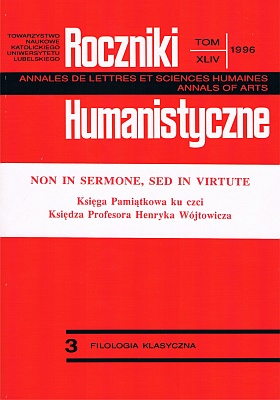Relacja pojęć λόγος − μῦϑος w pismach Platona 81
Abstrakt
In the present paper the author seeks to determine in what relationships are λόγος and μῦϑος in the writings of Plato, concepts so important for the proper understanding of the texts written by the founder of the Academy. The analysis begins with the depiction of the relationship between the concepts ἐπιστήμη and πίστις as they occur in the seventh book of the Republic, and then discusses their mutual relations to λόγος and μῦϑος. Ἐπιστήμη, being the true knowledge, is reached by putting right opinions in the form of strict reasoning (λόγος) and getting to their causes. In opposition to episteme there stands πίστις, which accepts opinions without any attempt at subordinating them to strict reasoning, and as such it occurs in myth. The latter's task to give some image of the truth, according to the definition put forward by Olimpiodor: μῦϑός ἐστι λόγος ψευδὴς εἰκονίζων ἀλήϑειαν. Myth and logos remain in the relation of mutual supplement to each other. The border between them being determined by the separation between different ways of presenting the truth, which refers to various conditions of being. Logos serves to describe reality grasped in an intellectual manner. Moreover, myth in Plato is a bearer of the aesthetic qualities linked with artistic imaging. Logos in Plato, as an outcome of reasoning, is definitely true, inasmuch as it deals with the ideal order. Dressed, however, in the garb of fictitious images it becomes myth, yet is not deprived of the elements of veracity. Logos and myth have a common ground, which is the expressed truth. Myth contains some elements of logos, but not the other way round. Myth fulfills the role of denotation on another level than the verbal layer of the mythical expression. At the same time it plays the function of persuasion which consists in acting on sentiment, and thereby making people accept a particular truth. It binds philosophy and religion, and is a symbolical putting into words what is ineffable.
Copyright (c) 1996 Roczniki Humanistyczne

Utwór dostępny jest na licencji Creative Commons Uznanie autorstwa – Użycie niekomercyjne – Bez utworów zależnych 4.0 Międzynarodowe.





